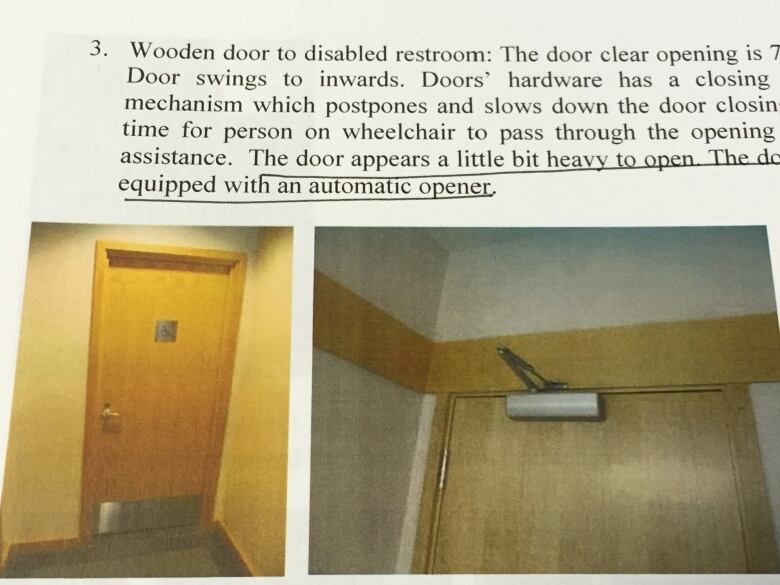N.W.T. legal aid's refusal to help human rights complainants 'systematically discriminating'
Adjudicator rules blanket policy denying legal help may cut off disabled from accessing justice

The N.W.T. government's legal aid office was wrong to refuse a disabled Yellowknife woman a lawyer to help her argue human rights complaints, an adjudicator has found.
Monday's ruling comes almost five years after Elizabeth Portman, a former territorial government employee who hasmultiple sclerosis, applied for and was denied legal aidfrom the Department of Justice's Legal Services Board.
Portman says it's not just her two human rights complaints that have been stalled as she waits for the legal aid issue to play out.
"My life has also been on hold, savings gone, unemployable with declining health, living on income support in a city riddled with barriers and ignorance," she wrote.
"It's been rather grim and a hard slog. Until these two complaints can get a ruling, nothing changes."
Portman was seeking legal help with two complaints: one against the Department of Health and Social Services, whom she alleges refusedto accommodate her disability, and another against Sun Life Financial and the territorial government at large, over whether people with disabilities of an episodic nature should qualify for long-term disability coverage.
After she was deniedlegal aid, Portman filed anothercomplaint, this time against the Legal Services Board. That complaint was dismissed by the director of the N.W.T. Human Rights Commission.
William McFetridge, the Alberta-based adjudicator tapped by N.W.T.'s legislative assembly to look into Portman's case, has called the commission's decision to dismiss Portman's complaint "unreasonable."
"Without legal assistance, access to the human rights complaint process is significantly more difficult for [persons with certain disabilities] than for persons without those disabilities," he wrote.
He found that:
- denying a disabled person access to legal aid can cut off their access to the human rights complaints process, since their disabilities may prevent them from being able to represent themselves
- the board's blanket policy against providinglegal help for human rights complaints, which dates back to 2011 and owes (according to the territorial government)tolack of expertise and funding limitations,doesn't take into account a person's disability
- the board didn't provide "substantive justification" for refusing Portman the aid
- with a third of human rights complaints in the N.W.T. having to do with disabilities, the board's policy is "systematically discriminating."
'Avery distressing experience'
McFetridge has ordered the board to stop refusing funding without considering whether a person's disability could hamper their access to justice.
He also called on the board to reconsider Portman's application with her disability in mind and for the Department of Justice to pay Portman a remedy of $10,000.
"This has been a very distressing experience for Ms. Portman and has, on occasion, exacerbated the symptoms of her MS," wrote McFetridge.

Laverne Jacobs, an associate law professor at the University of Windsor who helped Portman with her case, says the ruling shows that "there can be an adverse impact from a neutral policy."
Jacobs said Portman's victory could set a nationwide precedent for people with disabilities to receive legal aidto argue human rights cases.
"It means that other government and legal services boards may have to consider the implications of their acts on persons with disabilities or others that make applications," said Jacobs.
The department can appeal McFetridge's decision by asking for a judicial review from the N.W.T. Supreme Court, and may even ask for a stay that would delay the remedies ordered by McFetridge.
But the department is still reviewing the decision and is not prepared to comment, says spokesperson Marie-Eve Duperre.
Many other types of legal cases are also not eligible for legal aid in the N.W.T.:everything from "simple divorces" to a first offence for drunk driving.
Human rights caseover legislative assembly washroom
Portmanalso declined an interview, saying she was busy preparing for yet another human rights complaint process.
At a hearing today in Yellowknife, she will continue to argue that the N.W.T.'s legislative assembly failed in recent years to make the assembly building accessible to people with disabilities.
Portmansays she hasfirst-hand experience.
In 2013 she tried to enter the washroom for people with disabilities on the main floor of the legislative assembly, according to testimony she gave in May.
She was on crutches and had one leg in a cast and couldn't push open the heavy, wooden door to the washroom, which at the time was not equipped with an automatic opener. (One has since been added.)

Portman opted instead for the more easily accessible women's washroom.But without a grab bar in the toilet stall, she got stuck in the stall for several minutes, eventually struggling her way out of the washroom.
"It was humiliating. It was without dignity," she said during her testimony, adding that she was encouraged to speak with then-Speaker Jackie Jacobson, who she says ultimately never got back to her.
"The irony of a Speaker who won't speak is telling," she said.
The challenge of self-representation
Portman is representing herself during this complaints process a point she was quick to address via email given her previous bid for legal aid.
"I would like to stress that arguing about something as basic as not being able to get into an 'accessible' toilet in a public building is a far cry from" the complaints against territorial government, she wrote.
Still, during her May testimonyin that case,Portman wasoccasionally flustered,pausing to reorganize her thoughts, and at one point admittingto being tired.
CBC News asked Jacobs if she thought Portman's self-representation in the legislative assembly case could hurt her chances of receiving legal aid for her other complaints against the territorial government.
The fact that, in order to bring this case forward, she needed to search far and wide and find a law professor in Windsor who would take her case, I think, shows the difficulty of doing this on her own.- Laverne Jacobs, University of Windsor associate law professor
Jacobsdidn't think so, saying, "The nature of each case will be different. Maybe a person with a disability in a certain type of case [may find it] more complex or more tiring or more demanding in some way.
"The fact that, in order to bring this case forward, she needed to search far and wide and find a law professor in Windsor who would take her case, I think, shows the difficulty of doing this on her own."












_(720p).jpg)


 OFFICIAL HD MUSIC VIDEO.jpg)
.jpg)



























































































